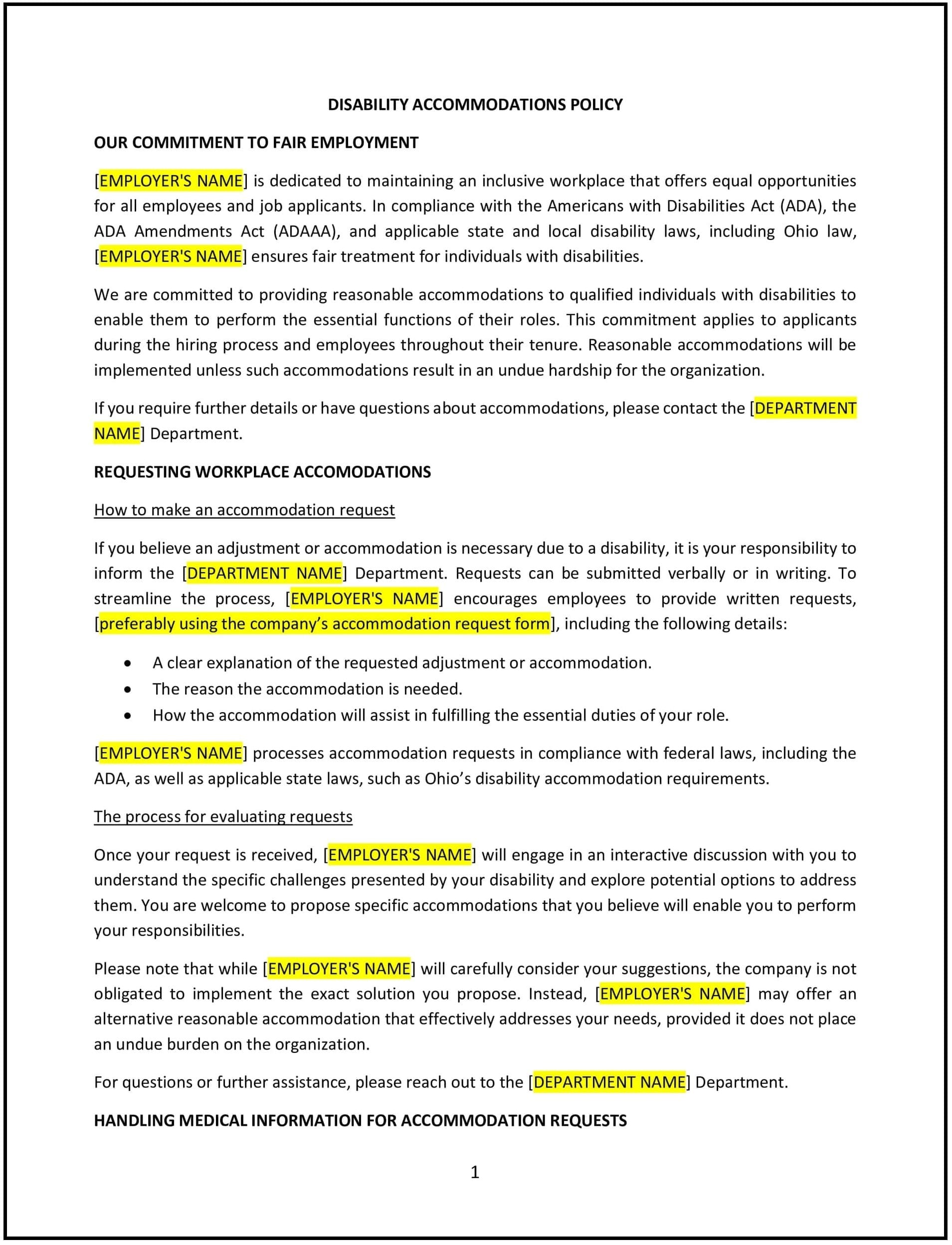Disability accommodations policy (Ohio): Free template
Got contracts to review? While you're here for policies, let Cobrief make contract review effortless—start your free review now.

Customize this template for free
Disability accommodations policy (Ohio)
A disability accommodations policy outlines the procedures for Ohio businesses to provide reasonable accommodations to employees with disabilities, in accordance with Ohio state laws and the Americans with Disabilities Act (ADA). The policy defines what constitutes a disability, the process for requesting accommodations, and the types of accommodations that may be provided. It also specifies the responsibilities of both the employer and the employee in facilitating these accommodations. The goal of this policy is to ensure that employees with disabilities have an equal opportunity to perform their job duties and succeed in the workplace, while maintaining compliance with legal requirements.
By implementing this policy, Ohio businesses can create an inclusive and supportive workplace that complies with disability rights laws, improves employee satisfaction, and enhances workplace diversity.
How to use this disability accommodations policy (Ohio)
- Define disability and reasonable accommodation: The policy should clearly define what constitutes a disability under Ohio state laws and the ADA, as well as what constitutes a "reasonable accommodation." This includes any adjustments to the work environment or job processes that allow employees with disabilities to perform essential job functions.
- Establish the accommodation request process: Specify the process employees should follow to request accommodations, including who to contact (e.g., HR, a designated compliance officer), what information is required, and how the request will be handled. The process should be simple, confidential, and prompt.
- Identify types of accommodations: The policy should provide examples of reasonable accommodations, such as modified work schedules, assistive devices, job restructuring, or changes to the physical workspace. It should also explain that the types of accommodations will vary based on the employee’s needs.
- Ensure confidentiality: Emphasize that all accommodation requests and related information will be kept confidential and shared only with those who need to know to facilitate the accommodation.
- Address the interactive process: Outline the interactive process between the employee and employer, which involves a dialogue to determine appropriate accommodations. The policy should specify that businesses are committed to working with employees to find solutions that meet their needs without causing undue hardship.
- Establish timelines for response: The policy should set reasonable timelines for responding to accommodation requests and making decisions, as well as for implementing accommodations. Timely responses show the business’s commitment to supporting employees with disabilities.
- Specify the employer’s obligations: Clarify the employer's responsibility to make reasonable accommodations, unless doing so would cause "undue hardship," which means significant difficulty or expense in relation to the size, resources, or nature of the business.
- Ensure compliance with Ohio and federal laws: The policy should emphasize that all accommodations must comply with both Ohio state laws and federal disability laws, including the ADA and Section 504 of the Rehabilitation Act.
- Review and update regularly: The policy should be reviewed and updated periodically to ensure it remains in line with Ohio state laws, federal regulations, and the evolving needs of the workforce.
Benefits of using this disability accommodations policy (Ohio)
This policy provides several key benefits for Ohio businesses:
- Promotes inclusivity and diversity: By providing reasonable accommodations, businesses create a more inclusive work environment, where employees with disabilities can thrive and contribute fully to the organization.
- Increases employee retention and morale: Providing accommodations helps employees with disabilities feel supported, valued, and more likely to stay with the business, reducing turnover and recruitment costs.
- Reduces legal risks: A clear and fair disability accommodations policy helps businesses comply with Ohio state laws and the ADA, minimizing the risk of discrimination lawsuits or penalties.
- Enhances workplace productivity: Accommodating employees with disabilities allows them to perform their job functions effectively, improving overall workplace productivity and efficiency.
- Strengthens company reputation: By offering reasonable accommodations, businesses demonstrate their commitment to equal opportunity and social responsibility, enhancing their reputation as an employer of choice.
- Supports compliance with legal obligations: The policy ensures that businesses fulfill their legal obligations under disability rights laws, helping to maintain a positive relationship with employees and avoid legal disputes.
- Improves workplace culture: Promoting diversity and providing accommodations fosters a culture of respect, fairness, and inclusion, which can positively impact employee satisfaction and teamwork.
Tips for using this disability accommodations policy (Ohio)
- Communicate the policy clearly: Ensure that all employees are aware of the disability accommodations policy by including it in the employee handbook, discussing it during onboarding, and regularly reminding employees of their rights and the process for requesting accommodations.
- Train managers and HR personnel: Provide training to managers and HR personnel on how to handle accommodation requests and engage in the interactive process. This will ensure that requests are handled appropriately and promptly.
- Make the process simple and confidential: The process for requesting accommodations should be straightforward, confidential, and easily accessible. Employees should feel comfortable requesting accommodations without fear of stigma or discrimination.
- Regularly assess accommodation needs: Review accommodation requests and the effectiveness of accommodations on a regular basis to ensure that employees’ needs are being met and that the accommodations remain effective.
- Keep records of accommodation requests: Maintain confidential records of accommodation requests and decisions, as required by law, for future reference or compliance purposes.
- Foster a culture of inclusion: Encourage open dialogue about disabilities and accommodations to create an inclusive workplace culture. Support employees in sharing their accommodation needs and addressing concerns in a respectful manner.
- Review and update regularly: Periodically review and update the policy to ensure it aligns with changes in Ohio state laws, federal regulations, and any new insights into best practices for disability accommodations.